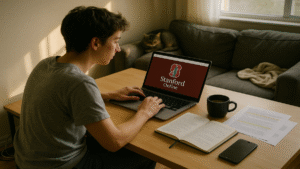I’ve sat across hiring managers who asked about hobbies as a warm-up, and others who seemed to mine the answer for more serious insight. For years, job seekers have debated whether revealing personal interests during an interview helps—or hurts. A growing body of advice suggests it depends less on the hobby itself, and more on how—and when—you bring it up.
Why personal interests surface during interviews
Whether prompted directly or not, hobbies can surface in interviews as a way for employers to humanize the process. According to guidance from Indeed, mentioning hobbies is a way to demonstrate well-roundedness and transferable soft skills. For roles where cultural fit and creative thinking matter, even a personal anecdote about weekend photography might reveal something useful.
When hobbies help your case
Done well, sharing hobbies can become an asset that distinguishes your professional narrative. Several recruiters I spoke with emphasized that candidates who integrated interests seamlessly created a lasting impression. Here’s where mentioning hobbies can genuinely strengthen your application:
- Transferable skills: Team sports demonstrate collaboration; woodworking can reflect patience and precision. Candidates who make the connection earn credibility.
- Cultural alignment: If the company values volunteerism, mentioning community service can be a plus. According to Murray Resources, congruent interests build trust.
- Memorability: Out-of-the-box hobbies—like building escape rooms or organizing charity marathons—can make you more memorable than a string of buzzwords.
- Balance and resilience: Stress-managing pastimes like yoga or painting hint at healthier work-life habits, which can indirectly suggest long-term performance potential.
“I used to think hobbies were filler,” says Jason, a cybersecurity analyst I interviewed who landed a new role in February. “But when I mentioned I played chess competitively, we ended up talking about strategic problem-solving for nearly ten minutes. That moment shifted the dynamic—I wasn’t just a résumé anymore.”
But here’s where it can go sideways
The same insights that help can just as easily backfire. Sharing too much or the wrong kind of activity creates risk. And not all hobbies carry professional weight—some may even raise subtle red flags.
Hobbies that can hurt perceptions
The National Careers Service warns that some interests may signal dissonance with a company’s values or cause concern about commitment and reliability. Based on multiple assessments including perspectives from Resumehead and Ask a Manager, the following types tend to hurt more than help:
| Hobby Type | Potential Concern |
|---|---|
| Extreme sports like base jumping | Raises liability or risk concerns |
| Political activism | May introduce polarizing views or disrupt team dynamics |
| Online gaming marathons | Could suggest time management issues |
| Heavy partying or bar-hopping | Signals potential reliability issues |
Even innocuous hobbies like “traveling” can fall flat if not contextualized. Some hiring managers regard them as generic placeholders unless tied back to a relevant competency—like adaptability or global mindset.
Smart ways to frame them
The key, according to experts on careers.webdew.com, is framing hobbies as extensions of your professional identity. That doesn’t mean overselling them, but rather anchoring your passions in applicable traits.
Use structure and story
The STAR technique (Situation, Task, Action, Result)—popular in behavioral interview answers—works especially well here. For example:
“I’ve volunteered to train amateur runners for our local 10K. Coordinating sessions for 20+ people weekly has improved my coaching and motivational skills, which I apply in team settings at work.”
Gauge the timing
If the interviewer seems open or asks about hobbies, it’s fair game. But hijacking a job-focused question to pivot into personal interests can be risky. Many recruiters agree that no more than 10% of the interview should orbit around hobbies unless prompted.
FAQ
How can I connect my hobbies to the skills required for the job?
Identify the core qualities the role demands. If you’re applying for a client-facing role requiring empathy, hobbies like community theater or mentoring children can demonstrate relevant interpersonal strengths. Tie each hobby back to a specific skill you actively use or improved through that interest.
What are some examples of hobbies that can demonstrate teamwork?
Sports like soccer or rowing, organizing group events, music bands, or any hobby where collaboration is key can illustrate group dynamics and shared goals. Consider using team-oriented pastimes to prove your ability to coordinate, compromise, and motivate collectively.
Should I avoid mentioning hobbies that might be perceived as controversial?
Yes. If a hobby could steer the conversation into divisive, perilous, or unprofessional terrain, consider omitting it. Recruiters from conservative sectors may be sensitive to politically active pastimes or high-risk activities. Better safe than sorry unless it’s directly relevant and framed appropriately.
How can I mention my hobbies without dominating the conversation?
Keep the answer short and narratively clean—no longer than two minutes. A concise story linking hobby to skill suffices, especially if you pivot back to the job requirements. Let the interviewer probe further only if they wish to.
What are some hobbies that can showcase problem-solving skills?
Puzzle-solving, escape room crafting, coding personal projects, or even cooking complex recipes can all demonstrate analytical thinking and creativity. Whatever you choose, it should involve structured thinking and measurable challenges, and ideally be relevant to the field you’re applying in.


